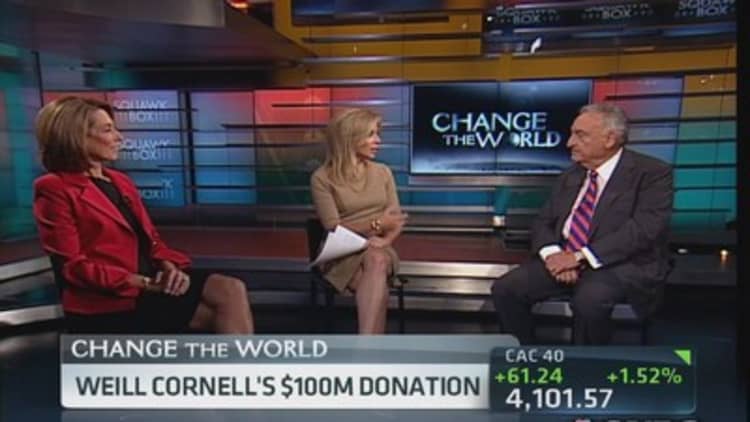
Former Citigroup Chairman and CEO Sandy Weill—who helped build one of the largest financial services company in the world—is making big waves again.
Weill told CNBC's "Squawk Box" on Tuesday that he and his wife, Joan, are making an additional $100 million donation to Weill Cornell Medical College, as a part of their $300 million fundraising effort entitled, "Driving Discoveries, Changing Lives." The fundraising effort will help fund research for diabetes, cancer and Alzheimer's. It will also be used to recruit leading research scientists and provide scholarships for the college's students across the globe.
(Read More: Philanthropy isn't just money: Joan and Sandy Weill)
(Read More: No bank breakup needed with right regulations: Weill)
(Read More: Hey Jamie, call me maybe: Sandy Weill)
The school's emphasis on research is credited for a string of recent medical breakthroughs, including the development of a prosthetic retina to treat blindness, sequencing of the prostate cancer genome for the first time and development of a vaccine that blunts the fix cocaine addicts get.
"This new $100 million gift from Sandy is just transformative for us at this point at Weill Cornell as we open our new Belfer research building and want to fill it with the very best and brightest researchers," said Dean Laurie Glimcher. "These funds are going to allow us to recruit wonderful new researchers who are really going to take their discoveries and translate them into new therapeutics, innovative treatments for patients because when it comes down to it, what is our mission as an academic medical center—it is to put the patient as the center of everything we do."
In a rare interview last week at his midtown offices, Weill said, "A long time ago my wife said to me: 'Shrouds don't have pockets' and we decided to live our life that way. But we really believe that philanthropy is not just about money but more importantly, it's about one's passion and one's ability and the desire to give of one's self and one's time to help an institution achieve better things." He added, "But after this, I've told them [Weill Cornell] they are not in my will."
Joan and Sandy and the Weill Family Foundation's philanthropic relationship with the college started in 1982. Since then, they have donated more than $600 million, including Tuesday's announcement—the most ever given to any medical school by a single donor, in addition to securing more than $2 billion in private contributions to support education, research and clinical care, according to Weill Cornell.
"When I think back to how my wife and I really started in philanthropy. She got involved early in our marriage working with the homeless people in Bellevue. Those were the days where they used to send them home at night and there were a lot of people sleeping in cardboard boxes in the entrances to buildings to get out of the wind," Weill recounted. "One night we were coming home from a restaurant and I hear this sound 'Hi Joanie, hi Joanie' and there is a body in a cardboard box in front of the building. She said this is how our life has been. I cover the streets you cover culture."
Weill has also been chairman of Carnegie Hall since 1991, chairman of the National Academy Foundation, which he started in 1982, and chairman of the Green Music Center at Sonoma State University since 2011.
"You can see all the things I do for the long term, and I am very proud to say that during the Great Recession of '08 and '09 all of my nonprofits were profitable. I say, we don't give money, we invest our money, and we want to get a return on that investment," Weill said. "And if you don't see a return, you won't be back for the second, or the third of the fifth time. With most people, the first time somebody contributes to an institution that really should be just the door opener to what can really happen over a long period of time. And Weill Cornell is a prime example of that."
—By CNBC's hedge fund specialist Maneet Ahuja. Follow her on Twitter @WallStManeet.


